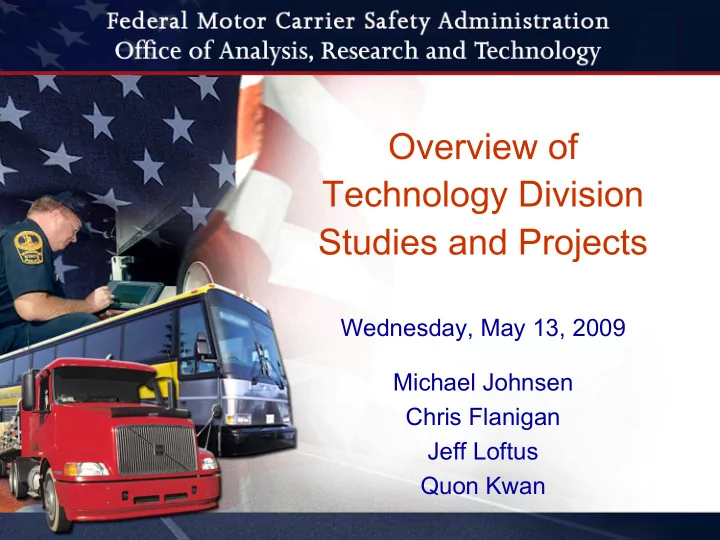

Overview of Technology Division Studies and Projects Wednesday, May 13, 2009 Michael Johnsen Chris Flanigan Jeff Loftus Quon Kwan
Technology Division Top Projects 1. SmartPark: Real-Time Parking Availability 2. Employer Notification Service: Phase II 3. Enhanced Rear Signaling: Phase II 4. Wireless Roadside Inspection Program: Phase II – Pilot Test 5. Indirect Viewing System Field Test: Phase III 6. On-Board Safety Systems Effectiveness Evaluation 2
Technology Division Top Projects 7. CVISN Deployment Program – Support for Expanded Capabilities 8. CDL 3rd Party Testing Anti-Fraud Software 9. Integrated Vehicle-Based Safety Systems 10.Onboard Safety Systems Deployment Program 11.Smart Infra-red Inspection System 3
Technology Division Personnel Michael Johnsen – Acting Division Chief Chris Flanigan – ENS, rear signaling, onboard safety systems Quon Kwan – CVISN grants, truck parking, CDL 3 rd Party Testing Anti-Fraud Julie Lane – CVISN, smart roadside, CSA2010 integration Jeff Loftus – Motor carrier efficiency, wireless roadside inspection 4
Technology Division Webinar Program SmartPark – Quon Kwan Motor Carrier Efficiency Study – Jeff Loftus Employer Notification Service – Chris Flanigan 5
SmartPark: Real-Time Parking Demonstrate technology for conveying real- time information on parking availability to truckers on the road 2 contractors, 2 different approaches 6
SmartPark – Purpose To demonstrate technology for conveying real-time information on parking availability to truckers on the road 7
SmartPark – 2007 Contract Awards Foster-Miller ● Imaging technology ● Demonstration Site − Charlton (public), westbound, I-90 Vehicle Sense, Inc. ● Magnetometer technology ● Demonstration Sites − Mile Marker 9 (public), northbound, I-95 − Interstate Travel Plaza (private), northbound, US-1 8
SmartPark – Foster-Miller Approach AutoScope Solo Terra video camera system Multiple trip line algorithm identifies and classifies vehicles by length Software algorithms adjust for variations due to weather, shadows, lighting conditions 9
SmartPark – Foster-Miller Approach 10
SmartPark – Vehicle Sense Approach Communications Diagram for MM9 11
Motor Carrier Efficiency Study (Sec. 5503) Conduct a study to: 1. Identify freight inefficiencies 2. Evaluate the safety & productivity benefits of wireless technologies 3. Conduct, as appropriate, field tests Program Elements ● Fuel monitoring and management systems ● Radio frequency identification technology ● Electronic manifest systems ● Cargo theft prevention ● Roadside inspection systems 12
MCES: Phase I Study Results Priority inefficiencies ● Waiting time for unloading ● Waiting time for border crossings ● Congestion delays ● Empty miles ● Hours of Service ● Fuel waste due to excessive speed ● Lack of backhaul ● Poor routing 13
MCES: Phase II – Current Activities Wireless Drayage Updating ● Integrated wireless solution for drayage motor carriers − Wireless load notification and selection − Truck-specific congestion avoidance − Wireless facility queuing notification and management (Virtual Queueing) ● Addresses: − Time loading/unloading − Empty miles − Congestion delays − Safety risks associated with bobtails ● Part of USDOT-led Cross-Town Improvement Program Partners: FHWA (lead), Kansas City Smartport, Mid-America Regional Council, Motor Carriers (Greer Transportation, Mid-Cities Transportation), Railroads (Union Pacific, Burlington Northern Santa Fe, Norfolk Southern, Kansas City Southern) 14
Employer Notification Service FMCSA research indicates that truck and bus drivers with past convictions are statistically more likely to be involved in future crashes Employers are not always notified about these convictions and are unable to take immediate and appropriate corrective action with drivers FMCSA requires: ● carriers to check driver history annually ● drivers to report CDL status changes within 30 days and suspensions within one day 15
ENS: Addressing the Problem Employer notification programs: ● Done on a State level and offered by private companies ● Proactively notify a carrier about the driving record of its drivers ● Allow the carrier to have real time updates of its drivers’ CDL status ● Streamlines a carrier’s ability to oversee its drivers 16
ENS: National Deployment Scenarios Federally-administered Third-party, market-based approach 17
Contact Information Michael Johnsen – Michael.Johnsen@dot.gov Chris Flanigan – Chris.Flanigan@dot.gov Quon Kwan – Quon.Kwan@dot.gov Julie Lane – Julie.Lane@dot.gov Jeff Loftus – Jeff.Loftus@dot.gov 18
Recommend
More recommend